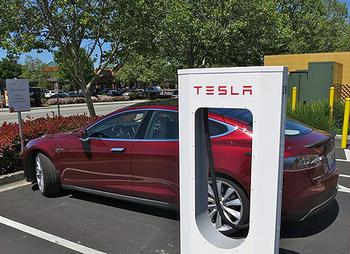
PALO ALTO, California, June 13, 2014 (ENS) – Tesla CEO Elon Musk has taken down the patents posted at the California headquarters of his luxury electric car company. Instead the innovative CEO wants to allow other electric vehicle manufacturers to use his technology to advance sustainable mobility worldwide.
“Yesterday, there was a wall of Tesla patents in the lobby of our Palo Alto headquarters. That is no longer the case. They have been removed, in the spirit of the open source movement, for the advancement of electric vehicle technology,” Musk said Thursday.
Musk declared that Tesla will not bring patent lawsuits against anyone who, in good faith, wants to use Tesla technology.

“Tesla Motors was created to accelerate the advent of sustainable transport. If we clear a path to the creation of compelling electric vehicles, but then lay intellectual property landmines behind us to inhibit others, we are acting in a manner contrary to that goal,” said Musk.
“We believe that Tesla, other companies making electric cars, and the world would all benefit from a common, rapidly-evolving technology platform,” he said.
Musk told reporters on a conference call Thursday that company shareholders need not fear that the decision will harm Tesla’s bottom line.
“It doesn’t really harm Tesla but helps the industry, and I think actually it will help Tesla, mostly with respect to attracting and motivating the world’s best technical talent,” said Musk.
Musk said Tesla will still file for patents partly to keep competitors from filing them and then preventing Tesla from using the patented information.
He said that Tesla is in a race not against other EV manufacturers but against the makers of petrol-powered vehicles who contribute to climate change.
“Given that annual new vehicle production is approaching 100 million per year and the global fleet is approximately two billion cars, it is impossible for Tesla to build electric cars fast enough to address the carbon crisis,” Musk said. “By the same token, it means the market is enormous. Our true competition is not the small trickle of non-Tesla electric cars being produced, but rather the enormous flood of gasoline cars pouring out of the world’s factories every day.”
Pointing out that programs for any vehicle that does not burn hydrocarbons at the major auto manufacturers are “small to non-existent,” averaging less than one percent of their total vehicle sales, Musk said he no longer fears that the big car companies would copy Tesla technology and then use their manufacturing, sales and marketing power to overwhelm Tesla.
“At best, the large automakers are producing electric cars with limited range in limited volume. Some produce no zero emission cars at all,” he said.
“Technology leadership is not defined by patents, which history has repeatedly shown to be small protection indeed against a determined competitor, but rather by the ability of a company to attract and motivate the world’s most talented engineers,” Musk explained.
“We believe that applying the open source philosophy to our patents will strengthen rather than diminish Tesla’s position in this regard.”
Comments on the Tesla website were overwhelmingly supportive.
One commenter wrote, “As a stockholder and a Model S owner, but mostly as a temporary resident of a threatened planet, I highly approve and am cautiously optimistic that this move will accelerate the cause of electrifying transportation.”
Another commenter wasn’t so sure. “Tesla will continue to draw top talent, out innovate, and make great products. That’s what matters, not patents. But I have to wonder, how could this move be abused? Could another car maker (start-up or big player) reverse engineer the Tesla charging port and have their cars start using the supercharger network for free?”
“If Tesla wants to stop them, now they can’t use patents to do it,” the commenter wrote. “This rogue 3rd party could just claim “in good faith we want to use Tesla technology to advance EVs”. Maybe Tesla would not want to stop them, but then would Tesla keep building supercharger locations if they were being used be non-Tesla cars?”
Musk is addressing this very point.
In a meeting with executives from the German automaker BMW Wednesday, Musk discussed sharing charging technology, he confirmed on the conference call.
“For high-speed charging in particular, I think that’s a great area for commonality among manufacturers. In fact, the team from BMW was visiting Tesla last night. We talked about potential ways to collaborate, and one of them was on the Supercharging network,” said Musk.
“We’re more than happy to have other manufacturers use our Supercharging network and/or to build superchargers and install them, and then maybe have some sort of cross-use agreement,” he told reporters.
BMW spokesman Kenn Sparks confirmed the meeting at Tesla, saying, “Both companies are strongly committed to the success of electro-mobility and discussed how to further strengthen the development of electro-mobility on an international level.”
Copyright Environment News Service (ENS) 2014. All rights reserved.
PHOTO: Tesla Model S at a Tesla supercharging station in Gilroy, California (Photo courtesy Wikipedia)
